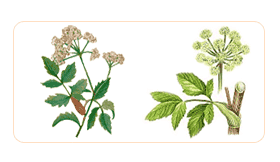A recent investigation conducted by specialists from the Kaiser Permanente Medical Care in California, does not support dong quai as an herbal remedy for the relief of menopausal symptoms such as hot flashes and sweating.

Dong quai, the crushed, dried root of the herb Angelica sinensis, has been used in traditional Chinese medicine for more than 2,000 years, but it has not been rigorously tested in clinical trials. Doctor Hirata, M.D., and colleagues from Kaiser Permanente Medical Center in Oakland, California, recently undertook a investigation to determine if dong quai had an effect on menopause when taken by itself.
Dong quai is currently used by thousands of American women to alleviate menopause symptoms. It is believed that this herb help to stabilize the fluctuating levels of hormones, but also, it's used to relieve other women's health issues such as premenstrual syndrome, gynecological infections, and irregular periods.
The researchers tried to confirmed if this herb really helps women. That is why, to achieve good results, the investigation studied 71 cases. Roughly half of them received placebos; dong quai recipients took three capsules three times daily of either dong quai or placebo. Women were follow the treatment for 24 weeks.
To check if there were changes when using dong quai, the investigators studied analyzed the endometrial thickness of the women participating in the investigation. Symptoms of menopause were evaluated according to Kupperman index and the diary of vasomotor flushes. Also, they examined the maturity of vaginal cells. Besides, the specialists tested the quantity of estrogen hormones in blood tests for estrogen levels. Menopause thins the endometrial lining, atrophies vaginal cells, drops estrogen levels and causes hot flashes and depression. Estrogen replacement therapy helps reverse each of these changes. On all four parameters, however, dong quai performed nearly the same as the placebo.
By the end of the study, there were no significant differences between the two groups of women in terms of symptoms or important physiological measures like estrogen levels in the blood. The researchers point out that their study does not prove that Chinese herbs are ineffective for menopause symptoms.
Besides, the investigators stated that the herbal menopause remedies sold over the counter in the United States typically use dong quai alone, while Chinese practitioners always prescribe it complemented by other herbs. Meanwhile, there is another double-blind clinical trial under way at Columbia University College of Physicians and Surgeons in New York in which 40 women are taking a mixture of 10 Chinese herbs (not including dong quai) to alleviate hot flashes. This will determine if herbal medicine is beneficial or just provides placebo effects.
What do these results suggest? Used alone, dong quai apparently has little or no effects in menopausal women. This correlates with the fact that Chinese healers rarely use it alone. However, since there are no studies targeting the use of dong quai combined with other agents, dong quai probably does possess some valuable health-enhancing properties.